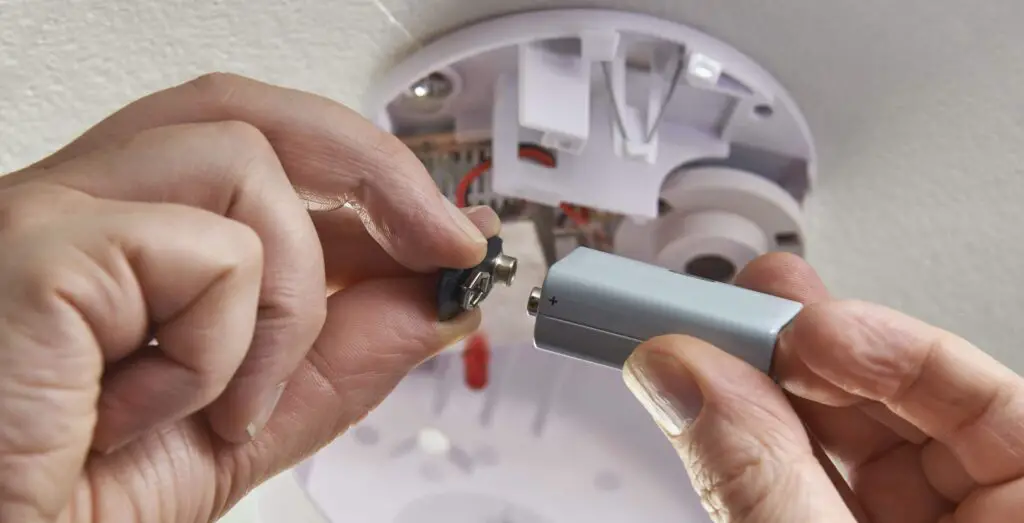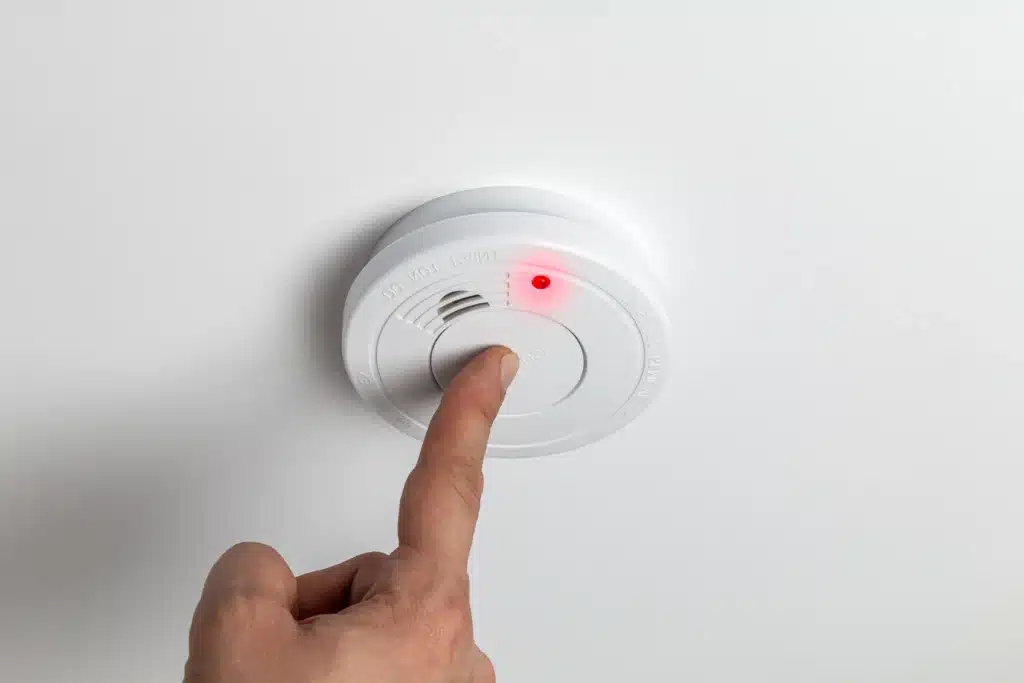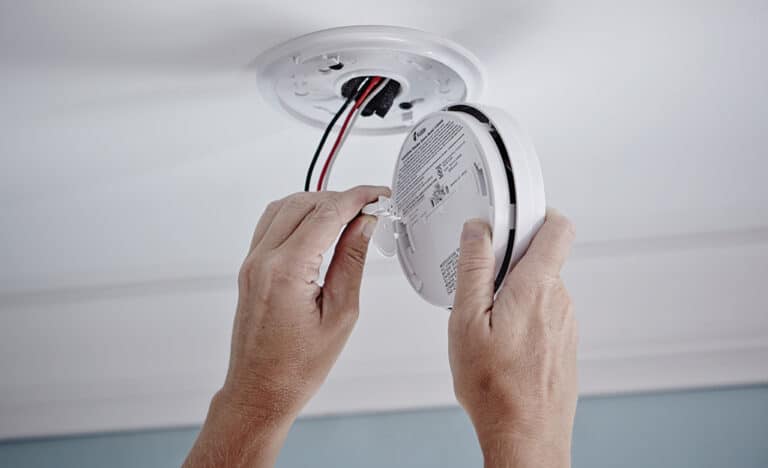Introduction
How to Stop Smoke Detector Chirping: Are you sick of your smoke detector beeping at night? Your situation isn’t unique. Many folks are frustrated by the noise and don’t know how to stop it. This article will explain why smoke detectors chirp and offer practical strategies to silence them. Smoke detectors save lives in fires. When they chirp randomly, they might be annoying. Low batteries often cause chirping. Your smoke detector will chirp when its battery is low, alerting you to replace it. This essential feature keeps your smoke detector working.
Another reason why check smoke detector may be chirping is due to a buildup of dust or debris. Over time, dust particles can accumulate inside the detector, causing it to malfunction and emit a chirping sound. In this case, simply cleaning the detector with a soft brush or vacuum can often solve the problem. It’s important to regularly clean your smoke detector to ensure it is free from any obstructions that could hinder its performance.
If you have tried replacing the battery and cleaning the detector, but the chirping persists, it may be a sign of a more serious issue. In some cases, the smoke detector itself may be faulty and need to be replaced. It’s important to remember that smoke detectors have a limited lifespan and should be replaced every 10 years. If your smoke detector is older than this, it’s a good idea to invest in a new one to ensure the safety of your home and family.

How do you get a smoke alarm to stop chirping without a battery?
Even after the battery has died, the detector maintains a residual charge that will keep the chirp going for at least seven days. To get the device to stop chirping once the battery has been removed, you must drain this residual charge by holding the test button for 15 seconds.
Any home or building needs smoke alarms to warn of fires. However, a smoke alarm chirping constantly, especially when it’s not due to a low battery, can be very aggravating. How can a smoke alarm cease chirping without a battery?
First, learn why a smoke alarm may be buzzing without a low battery. One explanation is that the smoke alarm may be old. Most smoke alarms should last 8-10 years before malfunctioning or setting off false alarms. Smoke alarms older than this may need to be replaced.
Dust or particles inside the smoke alarm may cause chirping. Dust can build up on sensors, generating sporadic alarms. You can gently vacuum the smoke alarm to remove dust and dirt. Before starting, turn off the smoke alarm and use a soft brush to avoid injuring the sensors.
Neither of these alternatives may work, thus the smoke alarm may need to be replaced. Since smoke alarms are sensitive, even a slight fault might cause them to chirp. If the smoke alarm still chirps after replacing the battery and cleaning it, replace it.
How do you stop smoke detectors from chirping at night?
Stopping a smoke alarm from beeping is often simple. Get a step ladder and carefully reach for the alarm. Pressing the “Test/Silence” button on the front of the unit should stop it from beeping or chirping. If this doesn’t work, grasp the device and turn it counterclockwise.
Any home or structure needs smoke detectors to warn people of fires. A smoke detector chirping in the middle of the night can disrupt sleep and be very annoying. Smoke detectors may beep at night due to low battery, dust, or malfunction. You can stop smoke detectors from chirping at night to get a good night’s sleep.
First, test the smoke detector batteries. Low batteries are a typical cause of smoke detector chirping. When the battery is low, the smoke detector will chirp to remind you to replace it. Change the battery to stop the nighttime chirping. To reduce chirping and extend battery life, use high-quality batteries.
Check for dust or debris if the battery is fine. As dust and particles collect, smoke detectors might malfunction and chirp. Use a soft brush or vacuum cleaner with a brush attachment to clean the smoke detector. Follow the manufacturer’s guidelines and avoid substances and abrasives that could damage the item.
If the smoke detector keeps chirping, it may be broken. For help, contact a skilled electrician or the manufacturer. They can analyze and repair or replace the smoke detector. A chirping smoke detector may signify a fire threat or a defective equipment that needs quick care.
Will a smoke alarm eventually stop chirping?
If your smoke alarm is battery-powered, it will chirp for a month before it dies. However, if it’s the hard-wired type with AC and a backup battery, it will chirp indefinitely until the backup battery is replaced.
Smoke alarms warn homeowners of fires. Intermittent smoke alarm beeping can be aggravating. Battery replacement is generally indicated by this chirping sound. What if the smoke alarm keeps chirping after replacing the battery? Will it stop itself?
The cause of the smoke alarm chirp determines the response. Smoke alarms may chirp after a battery replacement owing to a separate issue. A faulty smoke alarm may be to blame. Smoke detectors can become unreliable and start chirping when there is no smoke or fire. A new smoke alarm is the sole option in such instances.
Poor installation or positioning can also cause a smoke alarm to beep. Smoke alarms should be mounted on the ceiling or wall, away from corners and vents. A smoke alarm fitted improperly may not detect smoke, causing false alarms or constant chirping. Sometimes relocating the smoke alarm fixes the issue.
Dust and dirt can also clog a smoke alarm, affecting its performance. Smoke alarms need regular cleaning and maintenance to work properly. If a smoke alarm keeps chirping after replacing the battery, installing, and cleaning it, a professional may need to diagnose and remedy the problem.
After replacing the battery, a smoke alarm may stop chirping, but other issues may linger. To ensure the smoke alarm works properly and protects against fires, troubleshoot and fix these issues.
Will unplugging smoke detector stop chirping?
If you have to stop the hard-wired smoke detectors from beeping, you must unplug them from the clip and remove the battery. Sometimes, the hard-wired smoke detectors stop working properly and make beeping sound or have false alarms.
Although unplugging a smoke detector momentarily stops the chirping sound, it is not recommended. Smoke detectors warn us of fire threats and protect our property. The battery frequently needs replacing if it chirps. Ignoring this warning puts us at risk and reduces smoke detector efficiency.
To work effectively, smoke detectors must be maintained. They detect airborne smoke and sound a loud alarm to warn inhabitants of a fire. The built-in chirping sound indicates a low battery. Unplugging the smoke detector disables it, leaving us vulnerable to fires.
Smoke detectors are usually hooked into a building’s electrical system and have a backup battery for power outages. The smoke detector needs the backup battery to work when there’s no power. Disconnecting the smoke detector from the power supply may render it useless in a fire.
Address the cause of the chirping sound before unplugging the smoke detector. The chirping is usually caused by a low battery, which may be replaced. Replace the battery according to the manufacturer’s instructions and use the recommended type. Testing the smoke detector and replacing the battery as needed will keep it working and protecting you.
Unplugging a smoke detector to silence chirping is unsafe and ineffective. To fix the problem, replace the battery and maintain the smoke detector. We can ensure our homes and businesses have working smoke detectors to warn us of fire threats by doing so.
How long does the hush button on a smoke detector?
The hush feature on an alarm can be used to prevent the alarm from sounding when cooking with oil, as it will desensitize it to smoke for 7 minutes. However, it will beep every 30 seconds to indicate that the alarm is still off.
The smoke detector’s hush button can silence a false alarm or non-emergency signal. It conveniently silences the alarm without batteries or device disconnect. However, smoke detector models and brands affect quiet button duration.
Smoke detector hush buttons muffle warnings for 5–15 minutes. Throughout this period, smoke and fire alarms will work. If smoke or fire returns, the alarm will sound. After the hush button, this feature alerts the smoke detector.
Certain smoke detectors offer hush button duration modification. This allows silent alarms. Hush can quiet the alarm for 5, 10, or 15 minutes, depending on your preference.
A button may be replaced by “”silent mode”” on smoke detectors. This option mutes the smoke detector signal for 5–15 minutes when it detects a non-emergency. This helps when the smoke detector is in a high-traffic or false-alarm location.
Smoke detector hush buttons silence alarms for 5–15 minutes. It Smoke detectors vary in length and may have customizable quiet times or modes.
Smoke detectors beep for many reasons. Low batteries often cause issues. Smoke detectors chirp to alert you to change low batteries. Another option is a bad smoke detector. Smoke detectors might quack and fail because to dust and dirt. Smoke detectors with expiration dates may beep to prompt replacement.
Environment can also cause smoke detectors to beep. Smoke detectors may falsely signal in high humidity or cold. A brief power outage or surge may cause the chirping. Finally, some smoke detectors are connected, so if one senses smoke or a low battery, all will beep.
How can I troubleshoot a smoke detector that keeps chirping?
When a smoke detector keeps chirping, it can be quite frustrating and disruptive. However, there are several steps you can take to troubleshoot the issue and hopefully resolve it. Firstly, check the batteries in the smoke detector. A low battery is one of the most common reasons for chirping. Replace the batteries with fresh ones and ensure they are properly installed.
If the batteries are not the problem, try cleaning the smoke detector. Dust and debris can accumulate over time and interfere with its functionality. Gently vacuum the detector or use a soft brush to remove any dirt. Additionally, make sure the smoke detector is not located near any sources of steam or excessive humidity, as this can also trigger false alarms.
Are there any specific steps I need to follow to stop a smoke detector from chirping?
When a smoke detector starts chirping, it can be quite annoying and disruptive. However, there are specific steps you can follow to stop the chirping and ensure the detector functions properly.
The first step is to identify the reason behind the chirping. In most cases, a smoke detector chirps to indicate a low battery. Therefore, the first thing you should do is check the battery and replace it if necessary. Make sure to use a high-quality battery to ensure the detector’s optimal performance.
If the battery replacement doesn’t solve the issue, the next step is to clean the smoke detector. Dust and debris can accumulate over time, causing the detector to malfunction and chirp. Use a soft brush or vacuum cleaner to gently remove any dirt or dust from the detector. Be careful not to damage any components while cleaning.
What are some common solutions to fix a smoke detector that won’t stop chirping?
When a smoke detector won’t stop chirping, it can be quite frustrating and disruptive. However, there are several common solutions that you can try to fix the issue. Firstly, check the batteries in the smoke detector. A low battery is often the cause of chirping. Replace the batteries with fresh ones and ensure they are properly installed. It is recommended to use high-quality batteries to ensure a longer lifespan.
If replacing the batteries doesn’t solve the problem, try cleaning the smoke detector. Dust and debris can accumulate over time and interfere with its functionality. Gently remove the smoke detector from its mounting bracket and use a soft brush or vacuum cleaner to clean the vents and sensors. Be careful not to damage any components while cleaning.
In some cases, the smoke detector may need to be reset. Look for a reset button on the device or refer to the manufacturer’s instructions for the specific model. Press and hold the reset button for a few seconds until you hear a beep or see a light indicating that the reset was successful. This can often resolve any minor issues causing the chirping.
Are there any maintenance tips or best practices to prevent smoke detectors from chirping in the future?
Yes, there are several maintenance tips and best practices that can help prevent smoke detectors from chirping in the future. One important tip is to regularly clean your smoke detector to remove any dust or debris that may accumulate over time. Dust can interfere with the sensor and cause false alarms or chirping sounds. You can use a soft brush or vacuum cleaner to gently clean the exterior and interior of the smoke detector.
Another important maintenance tip is to replace the batteries in your smoke detector at least once a year, or as recommended by the manufacturer. Weak or low batteries can cause the smoke detector to chirp. It is also a good idea to test your smoke detector regularly to ensure it is functioning properly. Most smoke detectors have a test button that you can press to check if the alarm sounds. If the alarm does not sound, you may need to replace the batteries or the entire smoke detector.

Conclusion
If you are experiencing a smoke detector that won’t stop chirping, there are several steps you can take to resolve the issue. First, make sure to check the battery and replace it if necessary. A low battery is often the cause of the chirping sound. Additionally, ensure that the smoke detector is properly installed and mounted securely on the ceiling or wall. If it is loose, it may trigger false alarms and chirping noises.
If the battery and installation are not the problem, try cleaning the smoke detector. Dust and debris can accumulate over time and interfere with its functionality. Gently vacuum or wipe the detector to remove any dirt or particles. It is also important to test the smoke detector regularly to ensure it is working correctly. Press the test button and listen for the alarm sound. If it does not go off, it may be time to replace the smoke detector altogether.
If none of these steps resolve the chirping issue, it is recommended to consult the manufacturer’s instructions or contact their customer support for further assistance. They may be able to provide specific troubleshooting steps or recommend a professional technician to inspect and repair the smoke detector. Remember, smoke detectors are crucial for the safety of your home and should be kept in proper working condition at all times.
Addressing a chirping smoke detector requires a systematic approach. By checking the battery, ensuring proper installation, cleaning the detector, and testing it regularly, you can often resolve the issue. However, if these steps do not work, it is important to seek guidance from the manufacturer or a professional. Taking the necessary steps to address a chirping smoke detector will help ensure the safety and peace of mind for you and your household.

